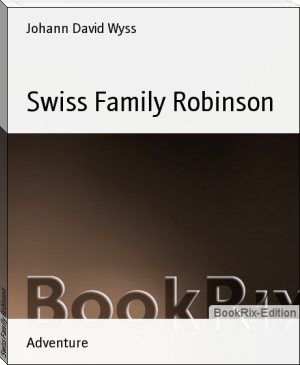Swiss Family Robinson - Johann David Wyss (poetry books to read txt) 📗

- Author: Johann David Wyss
- Performer: -
Book online «Swiss Family Robinson - Johann David Wyss (poetry books to read txt) 📗». Author Johann David Wyss
weight on board our craft; but when they saw us apparently
deserting them, they set up a piteous howl, and sprang into
the sea. I was sorry to see this, for the distance to the land
was so great that I scarcely expected them to be able to
accomplish it. They followed us, however, and, occasionally
resting their forepaws on the outriggers, kept up with us well.
Jack was inclined to deny them this their only chance of safety.
`Stop,’ said I, `that would be unkind as well as foolish; remember,
the merciful man regardeth the life of his beast. God has given
the dog to man to be his faithful companion and friend.’
Our passage, though tedious, was safe; but the nearer we approached
the shore the less inviting it appeared; the barren rocks seemed
to threaten us with misery and want.
Many casks, boxes and bales of goods floated on the water around
us. Fritz and I managed to secure a couple of hogsheads, so as
to tow them alongside. With the prospect of famine before us, it
was desirable to lay hold of anything likely to contain provisions.
By-and-by we began to perceive that, between and beyond the
cliffs, green grass and trees were discernible. Fritz could
distinguish many tall palms, and Ernest hoped they would prove
to be cocoanut trees, and enjoyed the thoughts of drinking the
refreshing milk.
`I am very sorry I never thought of bringing away the captain’s
telescope,’ said I.
`Oh, look here, father!’ cried Jack, drawing a little spy-glass
joyfully out of his pocket.
By means of this glass, I made out that at some distance to the
left the coast was much more inviting; a strong current however
carried us directly towards the frowning rocks, but I presently
observed an opening, where a stream flowed into the sea, and saw
that our geese and ducks were swimming towards this place. I
steered after them into the creek, and we found ourselves in a
small bay or inlet where the water was perfectly smooth and of
moderate depth. The ground sloped gently upwards from the low
banks to the cliffs which here retired inland, leaving a small
plain, on which it was easy for us to land. Everyone sprang
gladly out of the boat but little Franz, who, lying packed in
his tub like a potted shrimp, had to be lifted out by his mother.
The dogs had scrambled on shore before us; they received us with
loud barking and the wildest demonstrations of delight. The
chickens, geese and ducks kept up an incessant din, added to
which was the screaming and croaking of flamingoes and penguins,
whose dominion we were invading. The noise was deafening, but far
from unwelcome to me, as I thought of the good dinners the birds
might furnish.
As soon as we could gather our children around us on dry land,
we knelt to offer thanks and praise for our merciful escape, and
with full hearts we commended ourselves to God’s good keeping
for the time to come. All hands then briskly fell to the work
of unloading, and, oh, how rich we felt ourselves as we did so!
The poultry we left at liberty to forage for themselves, and
set about finding a suitable place to erect a tent in which to
pass the night. This we speedily did; thrusting a long spar
into a hole in the rock, and supporting the other end by a pole
firmly planted in the ground, we formed a framework over which
we stretched the sailcloth we had brought; besides fastening
this down with pegs, we placed our heavy chests and boxes on
the border of the canvas, and arranged hooks so as to be able
to close up the entrance during the night.
When this was accomplished, the boys ran to collect moss and
grass, to spread in the tent for our beds, while I arranged a
fireplace, surrounded by large flat stones, near the brook which
flowed close by. Dry twigs and seaweed were soon in a blaze on
the hearth, I filled the iron pot with water, and after I gave
my wife several cakes of the portable soup, she established
herself as our cook, with little Franz to help her.
He, thinking his mother was melting some glue for carpentry,
was eager to know `what papa was going to make next?’
`This is to be soup for your dinner, my child. Do you think
these cakes look like glue?’
`Yes, indeed I do!’ replied Franz, `And I should not much like
to taste glue soup! Don’t you want some beef or mutton, Mamma?’
`Where can I get it, dear?’ said she, `we are a long way from a
butcher’s shop! But these cakes are made of the juice of good
meat, boiled till it becomes a strong stiff jelly—people take
them when they go to sea, because on a long voyage they can only
have salt meat, which will not make nice soup.’
Fritz, leaving a loaded gun with me, took another himself,* and
went along the rough coast to see what lay beyond the stream; this
fatiguing sort of walk not suiting Ernest’s fancy, he sauntered
down to the beach, and Jack scrambled among the rocks searching
for shellfish.
* Even today all adult male Swiss are required by law
to possess, and know how and when to use, firearms.
A father who did not teach his sons these things, as
well as firearms safety, would be very neglectful.
I was anxious to land the two casks which were floating alongside
our boat, but on attempting to do so, I found that I could not
get them up the bank on which we had landed, and was therefore
obliged to look for a more convenient spot. As I did so, I was
startled by hearing Jack shouting for help, as though in great
danger. He was at some distance, and I hurried towards him with
a hatchet in my hand.
The little fellow stood screaming in a deep pool, and as I
approached, I saw that a huge lobster had caught his leg in its
powerful claw. Poor Jack was in a terrible fright; kick as he
would, his enemy still clung on. I waded into the water, and
seizing the lobster firmly by the back, managed to make it
loosen its hold, and we brought it safe to land.
Jack, having speedily recovered his spirits, and anxious to take
such a prize to his mother, caught the lobster in both hands, but
instantly received such a severe blow from its tail, that he flung
it down, and passionately hit the creature with a large stone.
This display of temper vexed me. `You are acting in a very childish
way, my son,’ said I. `Never strike an enemy in a revengeful
spirit, or when the enemy is unable to defend itself. The lobster,
it is true, gave you a bite, but then you, on your part, intend
to eat the lobster. So the game is at least equal. Next time,
be both more prudent and more merciful.’
Once more lifting the lobster, Jack ran triumphantly towards
the tent. `Mother, mother! A lobster! A lobster, Ernest! Look
here, Franz! Mind, he’ll bite you! Where’s Fritz?’ All came
crowding round Jack and his prize, wondering at its unusual
size, and Ernest wanted his mother to make lobster soup directly,
by adding it to what she was now boiling.
She, however, begged to decline making any such experiment, and
said she preferred cooking one dish at a time. Having remarked
that the scene of Jack’s adventure afforded a convenient place
for getting my casks on shore, I returned thither and succeeded
in drawing them up on the beach, where I set them on end, and
for the present left them.
On my return I resumed the subject of Jack’s lobster, and told
him he should have the offending claw all to himself when it was
ready to be eaten, congratulating him on being the first to
discover anything useful.
`As to that,’ said Ernest, `I found something very good to eat,
as well as Jack, only I could not get at them without wetting
my feet.’
`Pooh!’ cried Jack, `I know what he saw—nothing but some nasty
mussels—I saw them too. Who wants to eat trash like that!
Lobster for me!’
`I believe them to be oysters, not mussels,’ returned Ernest
calmly. “They were stuck to the rocks, so I am sure they are
oysters.”
`Be good enough, my philosophical young friend, to fetch a few
specimens of these oysters in time for our next meal,’ said I.
`We must all exert ourselves, Ernest, for the common good, and
pray never let me hear you object to wetting your feet. See how
quickly the sun has dried Jack and me.’
`I can bring some salt at the same time,’ said Ernest, `I remarked
a good deal lying in the crevices of the rocks; it tasted very
pure and good, and I concluded it was produced by the evaporation
of sea water in the sun.’
`Extremely probable, learned sir,’ cried I, `but if you had brought
a bag full of this good salt instead of merely speculating so
profoundly on the subject, it would have been more to the purpose.
Run and fetch some directly.’
It proved to be salt sure enough, although so impure that it
seemed useless, till my wife dissolved and strained it, when
it became fit to put in the soup.
`Why not use the sea-water itself?’ asked Jack.
`Because,’ said Ernest, `it is not only salt, but bitter too.
Just try it.’
`Now,’ said my wife, tasting the soup with the stick with which
she had been stirring it, `dinner is ready, but where can Fritz
be?’ she continued, a little anxiously. “And how are we to eat
our soup when he does come?’ she continued. `We have neither
plates nor spoons. Why did we not remember to bring some from
the ship?”
“Because, my dear, one cannot think of everything at once. We
shall be fortunate if we do not find even more things we have
forgotten.”
“But we can scarcely lift the boiling pot to our mouths,” she said.
I was forced to agree. We all looked upon the pot with perplexity,
rather like the fox in the fable, to whom the stork served up a
dinner in a jug with a long neck.’ Silence was at length broken,
when all of us burst into hearty laughter at our own folly in
not remembering that spoons and forks were things of absolute
necessity.
`Oh, for a few cocoanut shells!’ sighed Ernest.
`Oh, for half a dozen plates and as many silver spoons!’ rejoined
I, smiling.
`Really though, oyster-shells would do,’ said he, after a
moment’s thought.
`True, that is an idea worth having! Off with you, my boys, get
the oysters and clean out a few shells. And none of you must
complain because the spoons have no handles, and we grease our
fingers a little in baling the soup out.’
Jack was away and up to his knees in the water in a moment
detaching the oysters. Ernest followed more leisurely, and still
unwilling to wet his feet, stood by the margin of the pool and
gathered in his handkerchief the oysters his brother threw him;
as he thus stood he picked up and pocketed a large mussel shell
for his own use. As they returned with a good supply we heard a
shout from Fritz in the distance; we returned it joyfully, and
he presently appeared before us,





Comments (0)